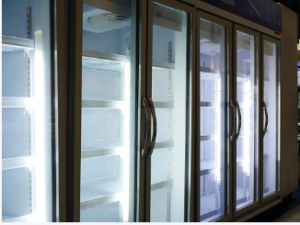Industrial refrigeration is a technique used to reduce the temperature of goods or materials to an ideal setting, which has become integral in many industries.
Though seemingly straightforward, industrial refrigeration Adelaide systems consume significant amounts of electricity and can cause major disruptions in production. Therefore, understanding the fundamentals of how they work is essential.
Pharmaceutical Industry
 The pharmaceutical industry is a vast and intricate enterprise that needs industrial refrigeration systems to keep raw materials, intermediates, and final products at the desired temperatures. This type of task demands reliable and high-quality refrigerant for successful operation.
The pharmaceutical industry is a vast and intricate enterprise that needs industrial refrigeration systems to keep raw materials, intermediates, and final products at the desired temperatures. This type of task demands reliable and high-quality refrigerant for successful operation.
The pharmaceutical industry invests heavily in research and development (R&D) to produce new drugs for consumers’ health. Recent increases in R&D spending by drug companies could indicate that profits from developing a new drug will be greater than anticipated or that there are more possibilities due to recent advancements in science and technology.
Many pharmaceutical refrigerators feature automatic defrost, helping to minimise the risk of freezer burn or frost that could damage the product inside and be fatal for patients.
Most pharmaceutical industrial refrigeration Adelaide units also have digital temperature monitors to help safeguard products stored inside. These thermometers can be used anytime to monitor temperatures and protect contents from spoilage or contamination.
Chemical and Petrochemical Industry
The chemical and petrochemical industry produces many goods that make modern life possible, from plastics and detergents to industrial chemicals and fuels. Their processes are high-tech, often requiring specialised equipment; moreover, safety regulations in these industries are extremely stringent – only approved products can be utilised during production.
Industrial refrigeration is essential in the chemical and petrochemical industry, as it ensures accurate temperature control of valuable raw materials during supply, refining, and transportation. Furthermore, it ensures operational continuity and flows stability to guarantee product quality.
As the global economy transitions toward a circular model, the petrochemical industry must adapt its innovation and development strategy. It must allocate more innovation budgets, capital investments and strategic thinking toward circular initiatives.
To achieve sustainability and circularity in business practices, companies must develop products and applications that promote energy efficiency, recycling and waste management.
Electricity Generation
Electricity is a form of energy generated from various sources, such as natural gas, coal, nuclear fission, biomass, geothermal and solar thermal. In industrial settings, this electricity powers machines or runs other processes.
Refrigeration systems are essential in many industries, such as pharmaceutical firms, food and beverage producers and chemical firms. These systems ensure product safety and efficiency during production or processing, and they’re also necessary to protect employees during hot climates.
Electrification has two significant advantages: it reduces the need for fossil fuels in production and minimises GHG emissions. Furthermore, renewable electricity generation is increasing.
The industrial refrigeration market is expected to experience rapid growth over the coming years, driven by rising demands for temperature control and regulation of goods, government initiatives to promote natural refrigerants, online grocery shopping trends and the development of cold chain facilities. Asia Pacific will also experience substantial expansion due to rising food and beverage manufacturing trends and technological advancements.
Food Industry
The food industry is an expansive network of farms and businesses that supply most of the world’s food needs. It includes everything from growing crops, harvesting them, distributing them, manufacturing food products and catering services!
Farms and fisheries are the primary producers of food. Farmers cultivate and sell everything from wheat to grapes and pork, while fisheries capture and sell wild seafood.
Refrigeration systems in the food and beverage industry tend to be straightforward, reliable, and inexpensive. Usually, they use a single-stage direct expansion vapour compression refrigeration (VCR) cycle, which involves a compressor, an evaporator, and a condenser.
VCR cycles involve the slow evaporation of a low-pressure cold liquid refrigerant within an evaporator coil. This gas then passes through an expansion valve and condenser until it reaches the desired temperature, at which point, it is condensed back to a high-pressure cold liquid.
Many food industries, from dairy farms to restaurants and grocers, require industrial refrigeration systems for optimal temperature management. It is essential to guarantee food safety and quality while keeping items fresh until they can be sold.
The food industry is a highly specialised field requiring various skill sets, such as agriculture and agrochemicals, manufacturing, marketing, packaging, storage and distribution. Furthermore, this sector plays an integral role in setting regulatory frameworks and standards at both national and international levels – which benefits consumers and the industry by guaranteeing food is safely produced and sold.